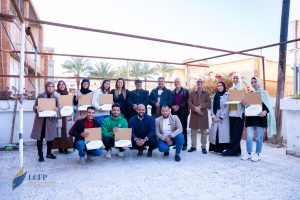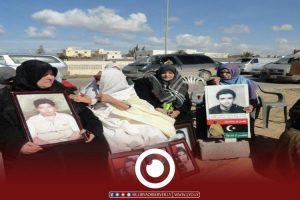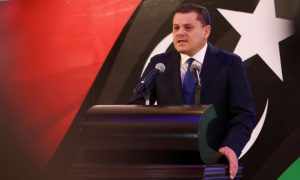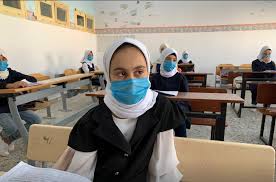The LCFP team of monitors completed today, Wednesday, intensive training on media monitoring techniques for political pluralism in the Libyan media. The training lasted 15 days, with the participation of 9 trainees at the Center’s headquarters in Tripoli. The trainer was the expert and researcher in the field of media monitoring, Fatima Al-Lawati. The first outcome of the training will be the issuance of the first research report on political pluralism in Libyan media. It is in the framework of the structural and legal reform program for the press and media sector in Libya.
The Chairman and members of the Board of Directors of the Libyan Center for Freedom of Press, and the Dean of the Faculty of Information at the University of Tripoli, Dr. Khaled Ghulam, participated in the distribution of training certificates to the trainees. The trainees will continue their work until the middle of next March, in order to monitor and analyze the content of 9 Libyan “state and private” media outlets. They will monitor 500 TV hours.
Prof. Dr. Mohamed Al-Asfar, Chairman of LCFP Board of Directors, said that these trainings are the first step towards more media research on how to analyse the content, assess the appearance of political figures in Libyan media and evaluate the respect of equal opportunities among all Libyan parties. That is the basis for ensuring fair representation for all through media funded by the state or by private entities.
It is noteworthy that media monitoring comes within the project of media coverage of the elections in the context of sensitive situations. The Project is part of the LCFP preparations for the upcoming national elections. The Project’s outcome is the issuance of the first research report on political pluralism in Libyan media.
Abu Saleem massacre, largest mass-killing operation in Libyan prison
The Abu Saleem prison massacre, which occurred on June 29, 1996, is considered one of the biggest violations of Muammar Al-Gaddafi regime in Libya and the largest mass killing operation, as it claimed the lives of about 1269 detainees, most of them prisoners of conscience.
On June 29, 1996, special forces raided Abu Salim prison, located on the outskirts of the capital, Tripoli, and fired at the prisoners, claiming their rebellion in the prison, which is the most fortified and guarded prison in Libya. Then, those forces buried the bodies in the prison courtyard and in mass graves scattered around Tripoli, and tried to conceal the crime by not telling the families of their fate.
For years, the families of the victims and human rights organizations had been calling for revealing the fate of the prisoners after any form of contact with them was lost, for the regime had been inviting the families of the dead from different regions of Libya to come to visit their sons, just to cancel the visits after their arrival and let the families wait for them in front of the prison for long hours with false pretexts.
The regime of Muammar Al-Gaddafi remained silent about the crime, denying its occurrence and preventing any talk about it, until 2009, when it began informing the families of the death of their sons.
During 2009 – 2010, the families of the victims and the missing escalated their protests and vigils demanding information about the fate of all detainees, and to reveal the cause of death through autopsies, and to launch an investigation to identify those responsible.
The case of defending the people in the Abu Saleem prison massacre was assumed by a Libyan lawyer called Fathi Terbel, who lost one of his brothers, a cousin and brother-in-law in the massacre. In statement Terbel said; ‘The detainees rebelled to press for better conditions, fair trail and the right to be visited by their families’. “This brutal and repressive regime carried out the massacre in two or three hours and tried to obliterate the crime.” Terbel added.
However, the Libyan authorities arrested him on Tuesday, February 15, 2011 on the eve of the start of the Libyan protests on February 17, which broke bout to overthrow the Libyan regime. The arrest of Terbel was the flame that ignited the revolution. Indeed, Abu Saleem prison was considered one of the main causes that triggered the Libyan revolution mid-February 2011.
Post-war Russia and the Return of Karafuto
By now, no one can believe that economic sanctions will force Putin’s Russia to rethink its invasion of Ukraine. The rouble has stabilized, methods of bypassing sanctions are well known, and China will keep economic lifelines open. It may sound trite, but Russia isn’t going to back off just because McDonald’s has shut down its Moscow branches.
As the fighting grinds on, however, another reality becomes clear: Russia’s war chest will suffice for carrying out its ‘special military operation,’ but those resources are unlikely to see it through the peace that follows. At that point, foreign capital will be necessary in order to offset its decoupling from the Western World.
A first-choice creditor nation will be China, which some have predicted may be playing a ‘long game’ that takes as its final objective the leasing or purchase of the Russian Far East. If this scenario is credible, China’s position on the war becomes something of a win-win. If, on the one hand, Russia should emerge from the war with something to show for it then China will feel a greater confidence in mounting an attack on Taiwan; whereas if, on the other hand, Russia accepts a bloody compromise, China will ask a good deal of it in return for continued support. In the event of the latter scenario, other creditors would need to step forward with competitive offers for Russia. In lieu of the West, where might those be found?
Japan offers one possibility, though at first glance an unlikely one. It has accepted Ukrainian refugees, imposed sanctions on Russia, and sent nonlethal military aid to Ukraine in the form of bulletproof vests. Moreover, the view in Tokyo is that establishing close relations with Russia has become a lost cause. In the past, such ventures had been intended to make Russia think twice about its relationship with China, a cherished idea that looked perfectly plausible before February of this year.
For the time being, this plan has been shoved to the back of the shelf. But it needn’t always remain there. After all, increased Chinese influence over the Central Asian Republics or, for that matter, the Russian Far East isn’t something Russia’s politicians feel comfortable about. On the contrary, the presence of Chinese traders in those regions has occasioned some alarm.
Accordingly, if Beijing were to suggest a ‘cash for territory’ deal, Moscow wouldn’t necessarily leap at the chance. Alternative offers might be welcome, particularly if they look likelier to be a one-time deal that carries lower risks at the military level. Resolving the ongoing dispute over what Japan calls the Northern Territories and Russia the southern Kurile Islands would tick every box.
Historically, these islands have been a flashpoint between Russia and Japan. Negotiations over their ownership date back to 1855, a year after Commodore Perry’s black ships partially opened Japan to the West. In the aftermath of the Russo-Japanese War a half century later, the territory south of the 50th parallel North was ceded to Japan, an arrangement that remained in place until the Soviet Union’s late entry into the Pacific War on 8th August 1945. At that point, the prefecture of Karafuto was disestablished as an administrative entity, becoming instead the South Sakhalin Oblast. One can only speculate how much of Hokkaido might have been absorbed in turn had the war not ended when it did.
That Japan desires the return of the Northern Islands / southern Kurile Islands is clear enough. Former Prime Minister Shinzo Abe held talks with Vladimir Putin 27 times in an attempt to achieve that objective, to no avail. Now the Russian invasion of Ukraine and the Kishida Administration’s termination of negotiations with Moscow has soured Russo-Japanese relations further. In the future, Japan faces the prospect of fresh military posturing from Russia, most likely spurred on by the Chinese, so as to split the Self-Defense Forces and negate any potential military leverage Japan might exert over the Taiwan issue.
But a weakened Russia, exhausted by war and keen to reopen trade with wealthy countries beyond China, might be willing to revisit the issue if Japan, in turn, were to put a reasonable figure on the reestablishment of Karafuto. Such a deal would require swiftness on Japan’s part, so as to take advantage of what will likely be a narrow window of opportunity. It would also require deft diplomatic maneuvering so as not to alarm the South Koreans, for whom memories of Japanese expansionism are never far from the surface.
Yet the rewards of such a deal, if properly executed, would go beyond a ceding of territory from one state to another. In the aftermath of what now appears to be a botched invasion of Ukraine, some means must be found to persuade politicians in Moscow, even if they are still under Putin’s thumb, that trading options exist beyond China. Moreover, an opportunity should be provided for them to demonstrate a new and genuine respect for the territorial integrity of sovereign nations with which Russia shares a land or maritime border. The return of some or all of the Northern Islands / southern Kurile Islands would provide a safe, uncontentious means for these assurances to gain substance.
رئيس الحكومة الليبية المكلف يؤجل زيارته إلى المغرب
أجّل رئيس الحكومة الليبية المكلف عبد الحميد دبيبة، زيارة مرتقبة للمغرب الجمعة، بسبب انشغالاته الداخلية، بحسب مسؤول مغربي.
وقال مسؤول بالخارجية المغربية مفضلا عدم ذكر اسمه، إنه ” تم تأجيل زيارة عبد الحميد دبيبة رئيس الوزراء الليبي نظرا لانشغالاته الداخلية”.
وأضاف المسؤول أن “وزير الخارجية المغربي، ناصر بوريطة، سيستقبل رئيس البرلمان الليبي، عقيلة صالح في وقت لاحق اليوم”. بدون ذكر تفاصيل أخرى.
والخميس، أعلنت وزارة الخارجية المغربية، أن بوريطة، سيلتقي الجمعة، عبد الحميد دبيبة، وعقيلة صالح.
وفي 5 فبراير/ شباط الجاري، انتخب ملتقى الحوار السياسي الليبي (75 سياسيا يمثلون أقاليم ليبيا الثلاثة) سلطة تنفيذية موحدة، على رأسها دبيبة لرئاسة الحكومة، ومحمد المنفي لرئاسة المجلس الرئاسي، مهمتها الأساسية إجراء انتخابات رئاسية وبرلمانية في 24 ديسمبر/ كانون الأول 2021.
Pandemic adds to war in keeping Libyan children out of school
Their young lives already disrupted by war, Libyan schoolchildren face even bigger obstacles to their education during the global pandemic than young people elsewhere.
With the number of cases surging unhindered across the North African country schools have tried different tactics from opening outside to seeking donations for extra disinfectants and facemasks to allow teaching indoors.
However, even those who have had no teaching for six months, or much prospect of it during the rest of this year, will have to pass an exam in order to progress to the next grade, the authorities have said.
“Students did not study anything. We did not teach anything for the students to learn. This is not a solution,” said teacher Amal Qleiwan, who is also the mother of a 10-year old.
“The decisions by the ministry of education are random and are not studied well.”
University professor, Ahmed Falaq, is home schooling his two children, aged 10 and 8, and his two nephews, aged 12 and 10.
“What will students do if there is a new wave of coronavirus? They will miss two years of their education. This is a big problem for parents and the students. We will have a generation of students with weak education,” he explained.
Libya now has more than 41,000 cases of the coronavirus, though with war-related chaos across much of the country officials admit there are probably many more going undetected. The United Nations has said it is “spiralling out of control”.
Meanwhile, according to U.N. estimates, the fighting in Libya had already displaced more than 150,000 people, 90,000 of whom are children and closed 200 schools, depriving more than 200,000 children of their schooling.
As the pandemic started to rage through Libya since August, medics working in the war-ravaged country’s few functioning hospitals faced their nightmare scenario – a surge in cases and dwindling resources.
Reporting By Ayman al-Sahely in Misrata, writing by Mai Shams El-Din in Cairo, editing by Angus McDowall in Tunis and Raissa Kasolowsky
After breaches, UN Security Council urges Libya’s backers to respect arms embargo
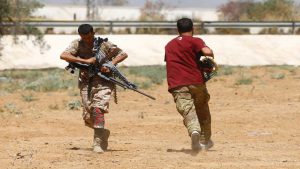
The council also called for a cease-fire and extended the UN mission in Libya by another 12 months.
The UN Security Council is urging the parties to Libya’s conflict to abide by a United Nations arms embargo and pull their proxy fighters from the war-torn country.
In a resolution adopted Tuesday, the 15-member body extended the UN’s mission in Libya by another 12 months. China and Russia abstained. The mission, known as the United Nations Support Mission in Libya, monitors human rights violations in Libya and aims to secure a cease-fire between the warring factions.
Libya descended into chaos after a NATO-backed uprising toppled dictator Moammar Gadhafi in 2011 and for the past six years has been embroiled in a civil war pitting two rival administrations against each other. The Turkey-backed Government of National Accord (GNA) is based in the capital, Tripoli, and Khalifa Hifter’s self-styled Libyan National Army (LNA) controls much of the eastern part of the country with the support of Russia, the United Arab Emirates and Egypt.
The foreign backers for both sides have flooded the country with mercenaries and arms in violation of a UN embargo in place since 2011. The UN’s acting Libya envoy, Stephanie Williams, told the Security Council on Sept. 2 that countries are stockpiling arms in a clear breach of Libya’s sovereignty. The arms buildup comes ahead of a looming battle for the oil-rich city of Sirte, which Hifter’s LNA has occupied since January.
Last week, the Pentagon said two Russian jets had crashed since deploying to Libya in May to bolster Hifter’s forces. The US Africa Command believes more than a dozen Russian fighter aircraft are being flown by pilots from Kremlin-linked private security contractor Wagner Group.
Also on Tuesday, the Security Council asked UN Secretary-General Antonio Guterres to appoint a new special envoy to Libya. Ghassan Salame, a former culture minister in Lebanon, cited stress when he quit the post in March after nearly three years as special envoy.
The new UN resolution calls on countries “to commit without delay to a lasting cease-fire and political dialogue under the leadership” of the new envoy.
Wagner has already crashed two Russian fighter jets in Libya, AFRICOM says
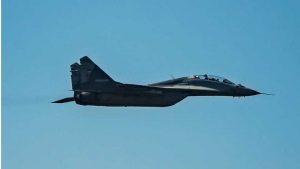
Russian regular forces are likely present in Libya, AFRICOM’s intelligence director said
Two Russian fighter jets have crashed in Libya since being deployed to country’s civil war on the side of Gen. Khalifa Hifter earlier this year, a senior US military official said today.
The US Africa Command believes more than a dozen Russian aircraft, first reported to have been deployed to Libya in May, are being flown by Wagner paramilitary pilots.
It is not clear whether the two MiG-29s were shot down, suffered mechanical failure or crashed because of pilot error, Rear Adm. Heidi Berg, director of intelligence for US Africa Command, told reporters by phone today. The first MiG crashed June 28, the other on Monday.
A video circulated on social media earlier this week in which a Russian-speaking pilot appeared to have landed in the desert with a parachute before being rescued by a Hind helicopter, which was painted in camouflage resembling that used by the Libyan National Army.
In the video, the pilot said he was no more than 70 kilometers (43 miles) from an airfield but did not specify which one. Berg said today that at least 14 Russian fighter jets are based out of Libya’s Jufra and Khdim air bases.
In May, the US military released aerial imagery showing MiG-29 and Su-24 aircraft on the ground in Libya, raising concern that the Kremlin was trying to “tip the scales” on behalf of Hifter in his fight against the UN-backed government in Tripoli.
AFRICOM said at the time that the fighter jets had been flown from Russia to Syria, where they were repainted before continuing on to Libya.
“These fighters are engaging in combat activity. We have seen them conduct ground strikes,” Berg told reporters. “They are not there for training the Libyan National Army.”
“We also know that they are not that good,” she said, referring to the two crashes.
Russia’s government denies it has military forces in Libya. Berg countered that narrative, saying AFRICOM assesses that it is likely that Russian military regulars are in the country, given how the Kremlin has deployed Wagner in other conflicts.
Some 338 Russian cargo flights arrived in Libya from Syria between November 2019 and the end of July, Berg said, citing the same number found in a United Nations report reported on by Reuters last week.
Last autumn, the US military assessed that Wagner only had “a handful of operatives” in Libya, Berg said. “Russian IL-76 aircraft travel from Syria into Libya regularly,” AFRICOM spokesman Col. Christopher Karns told Al-Monitor in July.
That number is now believed to be 3,000 Wagner fighters, as well as some 2,000 Syrian mercenaries fighting on Hifter’s side. The US military also assesses that Turkey has brought some 5,000 Syrian fighters to fight on behalf of the UN-backed government in Tripoli, and that Ankara has fielded several hundred regular forces.
For now, the cease-fire called for last week by Tripoli-based Prime Minister Fayez al-Serraj and Tobruk-based parliament Speaker Aguileh Saleh appears to be holding, despite the Libyan National Army’s vocal rejection, Berg said.
She said it is not clear whether that is out of respect for ongoing diplomatic efforts, or a need for both sides to resupply.
The State Department is exploring options with other nations for a demilitarization of the strategic coastal city of Sirte and the potential establishment of joint security cooperation as trust-building measures between the rival Libyan governments. The United States has repeatedly called on foreign militaries to leave the conflict.
AFRICOM commander Gen. Stephen Townsend warned in January that Turkey’s increased military support for Libya’s Tripoli-based government risked drawing in further Russian support for Hifter.
If Russia gains control of Libya’s oilfields via Wagner and introduces long-range air defenses to Libya, it could undermine potential for a future a solution to the war and pose a security threat to NATO’s southern flank, US officials have said.
Berg said AFRICOM does not assess that Russia has deployed long-range air defense systems such as the S-300 or S-400 to Libya. But she acknowledged that the mobile Russian SA-22 Pantsir defense system shot down an Italian drone and at least one US Reaper drone last year.
That has raised concerns among US military officials that Wagner personnel may misidentify aircraft in the multinational conflict. The United Arab Emirates, Egypt, France and other countries have reportedly conducted airstrikes on Libyan territory during the war.
Berg said that although suspected Wagner forces appear to be capable of deconflicting airspace along the Sirte-Jufra line, they have also declared no-fly zones in international airspace near Libya, leading to concerns that Russia’s irregular forces are pushing to expand their geographic control “well beyond their legal remit,” Berg said.
Earlier this week, two nuclear-capable US B-52 long-range bombers flew alongside Moroccan and Tunisian fighter jets in show-of-force missions over the southeast Mediterranean.
AFRICOM spokesman Col. Christopher Karns said the joint bomber exercise was not specifically directed at Russia’s presence in Libya. Statements by the command said the exercise was to show the US commitment to its partners in Africa.
“If Russia and China notice, that’s not a bad thing,” Karns told Al-Monitor via email.
EU stops Libya-bound ship suspected of violating arms embargo
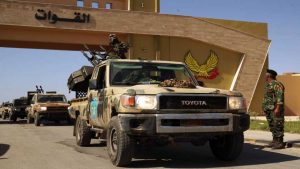
A merchant ship carrying jet fuel to Libya from the United Arab Emirates was stopped and inspected by European Union authorities on Thursday to determine whether the vessel had breached a United Nations arms embargo, EU officials said.
Two frigates stopped the Royal Diamond 7 roughly 150 kilometers north of the Libyan city of Derna in the Mediterranean Sea, according to a statement from the EU’s naval mission monitoring Libya, Operation Irini.
The ship had left from the Emirati port of Sharjah and was en route to the Libyan city of Benghazi “carrying a cargo of jet fuel, likely to be used for military purposes” in violation of the UN embargo.
The UN Panel of Experts on Libya alerted the EU naval authorities of the “suspicious nature of this cargo,” and after the initial inspection, the Royal Diamond 7 was diverted to an EU port for further investigation.
Irini is tasked with enforcing the UN arms embargo that’s been in place since Libya’s longtime dictator Moammar Gaddafi was toppled in 2011. Since beginning its work in May, the EU operation has monitored suspected vessels at more than 10 ports and landing points and detected 80 flights suspected of carrying military cargo to and from Libya.
For the past six years, Libya has been embroiled in a civil war pitting two rival administrations, their foreign backers and proxy fighters against each other. The internationally recognized Government of National Accord (GNA) is supported militarily by Turkey, and Gen. Khalifa Hifter’s eastern-based Libyan National Army counts the United Arab Emirates, Russia and Egypt among its patrons.
Foreign governments have flooded the oil-rich country with illegal arms. Last week, UN acting Libya Envoy Stephanie Williams warned that the build-up of advanced weaponry and influx of mercenaries is “further complicating local dynamics and chances of a future settlement.”
Earlier this year, a UN report said as many as 1,200 military contractors from Russian private security firm Wagner Group were operating in Libya to bolster Hifter’s forces. A recent US government watchdog report found Turkey had sent at least 5,000 mercenaries from Syria to fight on behalf of the GNA.
Ambassador Norland Encourages Leaders to Operationalize Calls for Ceasefire and Oil Production
PRESS RELEASE
Ambassador Norland spoke with Libyan political figures and officials on Sunday and Monday to assess progress in operationalizing the statements issued on Friday regarding a ceasefire and resumption of oil production in Libya. He told Prime Minister Sarraj in a phone call on Sunday that the GNA’s statement, along with that issued by House of Representatives Speaker Agila Saleh, represented very positive developments and agreed with the Prime Minister on the need for the UNSMIL-hosted “5+5” format to focus immediately on modalities of a ceasefire and how to establish an effective demilitarized solution in central Libya that begins the process of de-escalation and departure of all foreign forces and mercenaries from Libya.
Foreign Minister Siala told Ambassador Norland in a phone call that Libya welcomed the positive reactions from so many foreign states to Friday’s announcements, and agreed with the Ambassador on the importance of supporting the UN-led negotiations process.
In a call with Ihya Libya chairman Dr. Aref Nayed on Monday, the Ambassador discussed the growing political pluralism in Libya as Dr. Nayed and Speaker Saleh expand the range of voices calling for a genuine intra-Libyan dialogue in support of a political solution to the conflict.
In a call with NOC chairman Sanalla, the Ambassador confirmed U.S. support for arrangements that would permit immediate resumption of oil production with a transparent mechanism to ensure that revenues remain frozen pending negotiations between the Libyan parties on future distribution of resources. Ambassador Norland shared U.S. concern over alarming electricity shortages, especially in the context of the growing COVID-19 pandemic, and supported the right of citizens anywhere in the country to engage in peaceful protest. He urged Libyan leaders to work together to address the pressing needs of the people at a time of real opportunity for the country.
Intel: Russian mercenaries enter key oil field, Libya oil company says

A convoy of Russian mercenaries entered Libya’s Sharara oil field and met with the facility’s security forces yesterday, the country’s National Oil Corporation (NOC) said. The meeting comes as oil from the country’s major fields, under the influence of military strongman Khalifa Hifter, are shut down.
The United Nations-backed Government of National Accord (GNA) was hoping for a restart pumping at Sharara, which is located in Libya’s southwest, as the GNA broke out from Tripoli in recent months. The NOC blamed Hifter-aligned forces earlier this month for preventing Sharara from coming back online.
The corporation expressed “grave concern” about Wagner’s visit to Sharara, Reuters reported. Mustafa Sanallah, head of the Tripoli-based NOC, accused some parties involved in the conflict of “working in the background to support blockading forces.”
Wagner operates as an unofficial arm of Russia’s Defense Ministry, which backs Hifter in his war against the Tripoli-based government.
Why it Matters: Details of the reported meeting are not clear, but Wagner forces may be taking advantage of Libya’s fractious militia networks in an attempt to slow the GNA’s recent gains. Security forces at the oil field, under the umbrella of the Petroleum Facilities Guard, have cooperated with both sides in the past.
If Sharara restores pumping, the GNA would gain access to revenue that would likely help its recent countercampaign against Hifter’s so-called Libyan National Army.
The Tripoli-based NOC is the only body allowed under international agreement, enforced by the United States and European navies, to export oil from Libya. Funds are then sent to the central bank in Tripoli, which has previously sent revenues to the rival central bank in Benghazi in exchange for cooperation from Hifter’s side over other oil fields.
But independently funded by the United Arab Emirates, Hifter’s side cut off pumping from the country’s major oil fields in January in order to boost his then-stalled campaign against Tripoli. Since then, the tide has turned. If Hifter can keep the country’s fields shut down, it financially hurts both sides but could slow the GNA’s momentum.
What’s Next: If the GNA cannot get the southern fields pumping again, then the conflict could become a spending war between the two sides’ foreign backers. How long it would take before Turkey and the GNA consider accepting a cease-fire allowing Hifter’s control of Sirte is not clear.
If the GNA gains access to the southern fields’ oil, it is not necessarily clear the central bank in Tripoli will forward funds to Benghazi. This could give the GNA an advantage, potentially pressuring Hifter to restart the country’s eastern oil fields as well.
المركز المغاربي للأبحاث حول ليبيا
تعريف:
تأسس المركز المغاربي للأبحاث حول ليبيا في جوان - يونيو 2015 في تونس، وهو أول مركز من نوعه يعمل بكل استقلالية من أجل تعميق المعرفة بليبيا في جميع المجالات والقطاعات، ويرفد بالمادة العلمية جهود المجتمع المدني في ليبيا لإقامة الحكم الرشيد، المبني على التعددية والتداول السلمي واحترام حقوق الإنسان . مؤسس المركز: الإعلامي والباحث التونسي رشيد خشانة يقوم المركز بنشر مقالات وأوراق بحثية بالعربية والأنكليزية والفرنسية، ويُقيم مؤتمرات وندوات علمية، وباكورة نشاطاته ندوة حول "إسهام المجتمع المدني في إعادة الاستقرار والانتقال الديمقراطي بليبيا" يومي 5 و6 أكتوبر 2015 بتونس العاصمة.
موقع "ليبيا الجديدة"
موقع إخباري وتحليلي يبث الأخبار السريعة والتقارير السياسية والاقتصادية والثقافية والاجتماعية عن ليبيا، ديدنُه حق المواطن في الإعلام، ورائدُه التحري والدقة، وضالتُه الحقيقة، وأفقهُ المغرب العربي الكبير. يتبنى الموقع أهداف ثورة 17 فبراير ومبادئها السامية ويسعى للمساهمة في بناء ليبيا الجديدة القائمة على الديمقراطية واحترام حقوق الانسان والحكم الرشيد.

